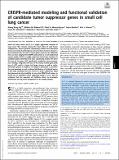| dc.contributor.author | Ng, Sheng Rong | |
| dc.contributor.author | Rideout, William M. | |
| dc.contributor.author | Akama-Garren, Elliot H. | |
| dc.contributor.author | Bhutkar, Arjun | |
| dc.contributor.author | Mercer, Kim L. | |
| dc.contributor.author | Schenkel, Jason M. | |
| dc.contributor.author | Bronson, Roderick T. | |
| dc.contributor.author | Jacks, Tyler E | |
| dc.date.accessioned | 2020-05-11T16:58:45Z | |
| dc.date.available | 2020-05-11T16:58:45Z | |
| dc.date.issued | 2019-12 | |
| dc.date.submitted | 2019-11 | |
| dc.identifier.issn | 0027-8424 | |
| dc.identifier.issn | 1091-6490 | |
| dc.identifier.uri | https://hdl.handle.net/1721.1/125148 | |
| dc.description.abstract | Small cell lung cancer (SCLC) is a highly aggressive subtype of lung cancer that remains among the most lethal of solid tumor malignancies. Recent genomic sequencing studies have identified many recurrently mutated genes in human SCLC tumors. However, the functional roles of most of these genes remain to be validated. Here, we have adapted the CRISPR-Cas9 system to a well-established murine model of SCLC to rapidly model loss-of-function mutations in candidate genes identified from SCLC sequencing studies. We show that loss of the gene p107 significantly accelerates tumor progression. Notably, compared with loss of the closely related gene p130, loss of p107 results in fewer but larger tumors as well as earlier metastatic spread. In addition, we observe differences in proliferation and apoptosis as well as altered distribution of initiated tumors in the lung, resulting from loss of p107 or p130. Collectively, these data demonstrate the feasibility of using the CRISPR-Cas9 system to model loss of candidate tumor suppressor genes in SCLC, and we anticipate that this approach will facilitate efforts to investigate mechanisms driving tumor progression in this deadly disease. Keywords: small cell lung cancer; CRISPR; GEMM | en_US |
| dc.description.sponsorship | National Cancer Institute. Koch Institute Support (Grant P30-CA14051) | en_US |
| dc.language.iso | en | |
| dc.publisher | Proceedings of the National Academy of Sciences | en_US |
| dc.relation.isversionof | http://dx.doi.org/10.1073/pnas.1821893117 | en_US |
| dc.rights | Article is made available in accordance with the publisher's policy and may be subject to US copyright law. Please refer to the publisher's site for terms of use. | en_US |
| dc.source | PNAS | en_US |
| dc.subject | Multidisciplinary | en_US |
| dc.title | CRISPR-mediated modeling and functional validation of candidate tumor suppressor genes in small cell lung cancer | en_US |
| dc.type | Article | en_US |
| dc.identifier.citation | Ng, Sheng Rong et al. "CRISPR-mediated modeling and functional validation of candidate tumor suppressor genes in small cell lung cancer." Proceedings of the National Academy of Sciences of the United States of America 117, 1 (January 2020): 513-521 ©2020 National Academy of Sciences. | en_US |
| dc.contributor.department | Massachusetts Institute of Technology. Department of Biology | en_US |
| dc.contributor.department | Harvard University--MIT Division of Health Sciences and Technology | en_US |
| dc.contributor.department | Koch Institute for Integrative Cancer Research at MIT | en_US |
| dc.relation.journal | Proceedings of the National Academy of Sciences of the United States of America | en_US |
| dc.eprint.version | Final published version | en_US |
| dc.type.uri | http://purl.org/eprint/type/JournalArticle | en_US |
| eprint.status | http://purl.org/eprint/status/PeerReviewed | en_US |
| dc.date.updated | 2020-03-30T13:24:06Z | |
| dspace.date.submission | 2020-03-30T13:24:10Z | |
| mit.journal.volume | 117 | en_US |
| mit.journal.issue | 1 | en_US |
| mit.license | PUBLISHER_POLICY | |
| mit.metadata.status | Complete | |
